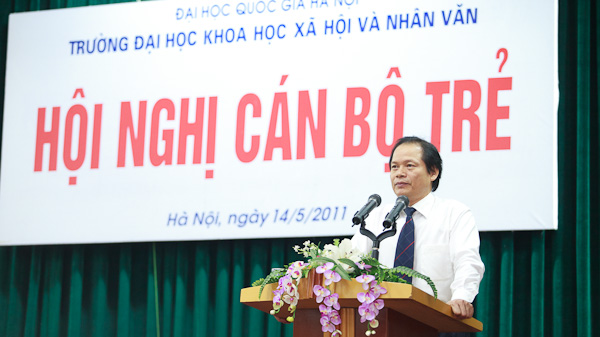The 3rd Young Cadres Conference of the University of Social Sciences and Humanities took place on May 14, 2011. Attending were representatives of VNU leaders, the University leaders and nearly 200 young cadres from the whole university. The conference focused on discussing issues related to the training and development of young cadres: difficulties, advantages and specific solutions.
Building and developing qualified young staff
In his opening speech at the conference, Prof. Dr. Nguyen Van Khanh - Principal of the School - emphasized: For many years now, the work of training and developing young cadres has been of great interest and importance to the School. Currently, over 50% of the school's staff are young cadres, and in just 5-10 years they will become key and core cadres. And to achieve that goal, one of the top priorities is the issue of building and developing a team of qualified young cadres.

Assoc. Prof. Dr. Dang Xuan Khang - Head of the Department of Personnel Organization - in the overview report on "Current situation and solutions for developing young staff of the University of Social Sciences and Humanities" also stated that the young staff in recent years have made many contributions to the development of the University. This will be the force playing a key role in developing the University into the ranks of leading universities in the region and internationally. To meet that goal, the young staff needs to: - Accelerate the rate of PhDs in the teaching staff. Require 100% of young lecturers to register for the doctoral exam. If they do not register for the exam within the prescribed time, the University will put them on the list of lecturers who have not completed their tasks and will not support tuition fees for those who register for the exam later than prescribed. - All PhD students must annually report on the progress of implementation and expected time to complete the thesis. If they do not report, it will be considered as not completing their tasks and will not be considered for regular salary increases. - Apply sanctions (rewards, penalties) for cases of early completion and cases of failure to complete PhD programs on time. - Continue to organize foreign language classes in different ways, for different subjects. - Give priority to young cadres to attend conferences and seminars abroad. Give priority to assigning scientific research topics to young cadres. Research and organize regular scientific conferences and seminars for young cadres. - Organize professional education management and information technology classes for leaders and managers at all levels. And from now on, schools, units as well as each cadre must accelerate training and self-training to meet the tasks in the new development stage.
Staff suggestions
In the speech "For a sustainable development of the Faculty of History today, tomorrow", Associate Professor, Dr. Nguyen Hai Ke - Head of the Faculty of History - affirmed: The young staff is today, is tomorrow. Nurturing young staff, the maturity of the current generation of young staff is for the current generation. However, young staff are still facing many difficulties in life, in nurturing and developing to improve their professional qualifications. From life, from the working and studying process of himself and previous generations, Associate Professor, Dr. Nguyen Hai Ke said: to nurture the next generation, first of all, the previous generation must set an example; and nurturing is self-cultivation; nurturing is creating conditions for young staff to participate in research and teaching work with previous teachers; nurtured with specific, deep, sincere attention... Starting from their own thoughts, aspirations and needs, young cadres are the ones who understand their own advantages and difficulties better than anyone else to come up with practical solutions: MSc. Dong Duc Hung (Faculty of Information - Library) proposed the idea of building a model of a Young Cadre Club to connect young cadres of the School, the club can operate in the form of periodic activities, with units taking turns to preside...
MSc. Vo Minh Vu (Faculty of Oriental Studies) made a number of specific proposals for young cadres to develop and complete their professional tasks well, such as: reducing administrative workload for young cadres by setting clear standards and demarcations; supporting young cadres to study and improve their qualifications; building research programs specifically for young cadres; having appropriate reward systems...

MSc. Nguyen Thi Nam Hoang (Faculty of Literature) made a number of proposals on the issue of improving the qualifications of young cadres: the assistance of experienced cadres and managers to have a program and study plan to strive for in each stage with specific goals and requirements, taking into account difficulties in individual circumstances. Young cadres need to combine well the study of compulsory training programs to obtain degrees and certificates with self-study and research according to their needs and professional orientation. After listening to the reports and comments at the conference, Prof. Dr. Vu Minh Giang - Vice President of VNU - highly appreciated the policy of maintaining regular conferences for young cadres of the university. The Vice President once again affirmed the importance of Social Sciences and Humanities for the development of the country and the role of young cadres for the future development of the university. In addition, the Deputy Director noted that the important and essential solution to develop and improve the capacity and quality of young staff is from the staff themselves, young staff must be proactive, strive to improve their qualifications. Next, the School also needs to trust and assign work to young staff, focusing on improving the quality of input...

